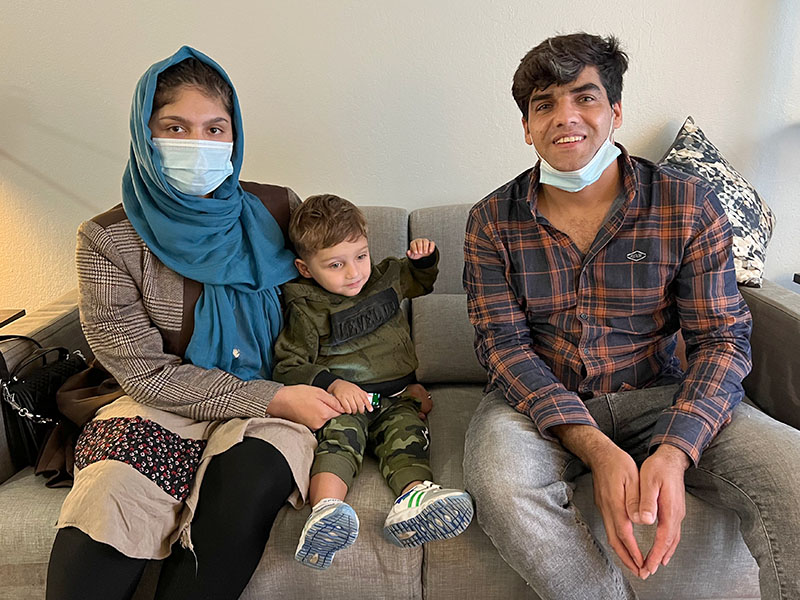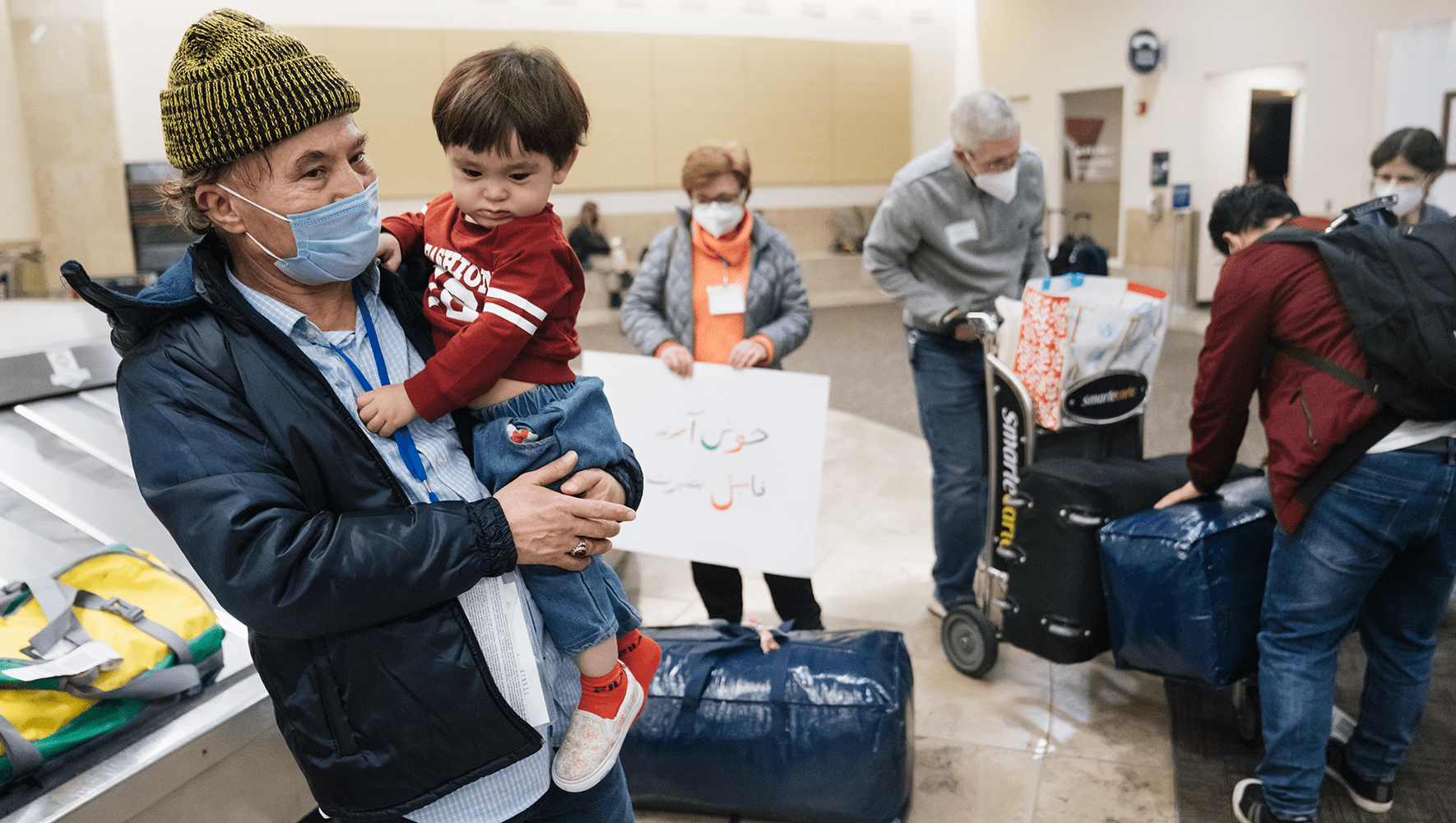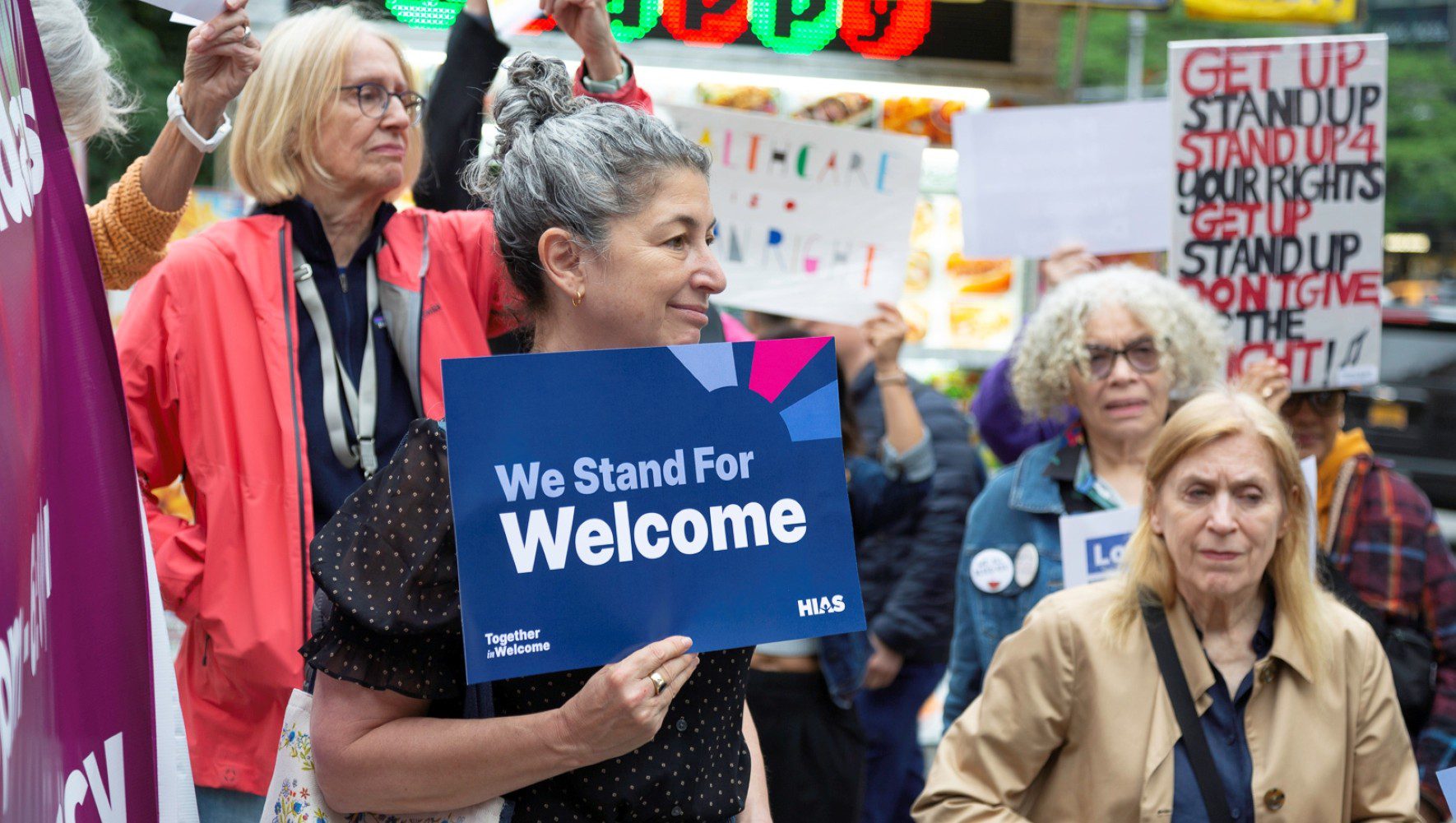Corporate Partners Help Afghans Find Shelter in a Perfect Housing Storm
By Dan Friedman
Nov 09, 2021

Resettled Afghan SIV Abdul, his wife, and his two-year-old son in Oakland, CA, October 29, 2021. The family has a roof over their head thanks to HIAS corporate partner Apartment List working with the Veritas housing group.
(Nicole Belanger/ Veritas)
The 54,000 Afghans stuck on eight U.S. Army bases have just sailed into a perfect storm. Working with HIAS, partners from America’s private sector may be the ones helping to build the first bridge across this troubled water.
After a traumatic evacuation from their home country, these newest Americans need a good home and a fair shot at making a new life. But before they can begin their next chapter, they first need to leave the army bases where they have been living since August. Resettling over 50,000 refugees means finding about 12,000 affordable units at short notice in the middle of what The New York Times called a “nationwide housing affordability crisis.”
Fouzia Azizi, the Director of Refugee Services at HIAS resettlement partner Jewish Family & Community Services East Bay, notes how this affects her clients, “Newly arrived refugees face numerous challenges simply in securing market-rate apartments, homes, and other properties for rent that are openly on the market.”
Finding safe, affordable housing for refugees arriving in America has never been easy, but for the Afghans evacuated this summer, the situation is especially fraught. Moreover, on top of the housing crisis, U.S. resettlement agencies are still struggling to staff up and rebuild after four years of an administration that tried to destroy the refugee program.
But more than anything else, the sheer volume of Afghans, all coming at the same time, has strained even the most experienced refugee professionals.
“It’s an unprecedented and ongoing challenge that HIAS and our 20 affiliates engage with every day,” said Alicia Wrenn, HIAS’ senior director of resettlement and integration.
The reason there’s a lack of any housing is threefold. First, the pandemic has reduced the availability of affordable housing in most of the urban areas where resettlement takes place. Normally there’s movement of populations in and out of apartments, but that has, more or less, frozen during the Covid-era.
This phenomenon comes on top of a general upward trend in rental prices as city centers are gentrified and improved, bringing the second problem, cost. The average rent of apartments varies across America but, the total stipend provided by the government per resettled refugee, say, an Afghan driver for the U.S. Army, on arrival, is $1,225 (or, if he is part of a family of four, $4,900). Until he’s bringing in a salary, that has to cover food, rent, transport, clothing and, for example, language classes.
Which brings the third problem, trust. Related to the rising costs, major investors have become what The Wall Street Journal called “a potent new force in the U.S. housing market.” The challenge of new corporate landlords to the resettlement community is that on the one hand they do not have the same long-term relationships that agencies have cultivated with local landlords and on the other, they are not set up to process people, like anyone newly-arrived in the country, who have no American credit history or references.
On top of all this, Azizi adds, “in some cases, too, we see landlords discriminate against foreign-born, non-English speaking, applicants.”
A very real danger coming from this lack of housing is that arrivals will be placed in unsuitable temporary shelter that will become permanent, that they will be forced into an isolated enclave without proper, organic means for integrating into wider American society or that they will be pushed into tough neighborhoods where their future lives as Americans may be troubled.
Faced with an undersized bureaucracy and an NGO-world at full stretch, corporate partners across the United States have reached out to help cushion the impact of the housing crisis on the new arrivals by making temporary accommodation available.
Five years ago, when AirBnB joined with HIAS to help ensure that refugees had access to temporary housing, it was one of HIAS’ few corporate sponsors. This year, more than 20 corporate partners have reached out to HIAS to help in housing Afghans, providing them with employment, and providing essential living materials for their new life in America.
“Private sector partners stepped up in a major way to support the Afghan response,” said Jessica Reese, HIAS’ VP of Institutional Development. “They quickly asked how they can help and have been flexible and supportive.”
Along with AirBnB, Hilton Hotels, Apartment List and Red Roof Inn have pledged short term accomodations for these new Americans, bringing the arrivals closer to regular American society while buying time for resettlement professionals to find sustainable housing and employment.
“Everyone is overwhelmed by the massive arrivals,” said Alla Shagalova, the director of HIAS New York. “The pace at which people are arriving makes it one emergency after another.”
Normally, resettlement agencies like Shagalova’s get weeks of notice about arrivals, This allows them to navigate a tricky market using their contacts and experience to prepare for their clients. The current situation is different.
Last month, for example, “a late-changing situation gave us 48-hours notice to fix all the arrangements for a family of five arriving in from an army base. In that time, we needed to sort out an airport pickup, as well as prepare housing and provide food — which for that family meant a hot meal on arrival and groceries for several days.”
Usually, said Shagalova, “new arrivals stay with family members or in permanent housing but this is an emergency and AirBnB is a lifesaver.”
And it’s not just housing. Corporate America has reached out to say that it wants to partner in finding employment — which is so crucial to promoting the virtuous cycle of self-sufficiency, self-worth, and integration. Henry Schein, Manpower, Amazon, and Bright Horizons childcare are among a dozen major corporations that have approached HIAS to help the arrivals find employment.
Their offers are vital because time and capacity are of the essence. Arrivals, of Afghans and others, are expected to stay at current levels for the rest of 2021 and well into 2022. Any refugees caught in bottlenecks or bad neighborhoods risk compounding the problems for those arrivals behind them.
In the fiscal year that ended September 30, the pandemic and the anti-immigrant policies of the Trump administration meant that fewer than 12,000 refugees were welcomed into America. At least 54,000 Afghans will be resettled in the next few months. And, since President Biden set the annual cap for 2022 at 125,000 arrivals — a number that does not include Afghans — the demand for housing for new Americans will stay high for the foreseeable future.
“With our 24 affiliate-locations around the country working with us around the clock, we are confident that we will be able to provide the resettlement support that will be a credit to this country and a bedrock to future Afghan American communities,” affirmed Wrenn.
Fresh from fighting for democratic ideals in their now hostile, homeland, families arriving from Afghanistan will have to earn their livelihood in a totally different economy, language, and climate. But, at least, with a welcoming roof over their heads, major organizations cheering them on in the job market and dedicated resettlement professionals rushing to help their longer-term prospects, they have a chance of prospering in their new homeland.



